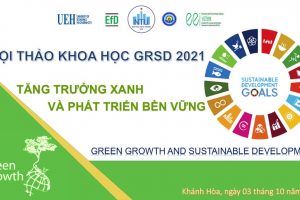[STBI-24-09-2015] Is Having an Economic Superpower Always a Good Thing? The Impact of the HaiyangShiyou 981 Event on Vietnam’s Stock Markets
by Dr. Thai-Ha Le
11:00 am, Thursday, 24-9-2015
Hall H.001, UEH School of Economics
Tóm tắt chủ đề | Abstract
The principal aim of this study is to examine the impact of the HaiyangShiyou 981 (HD-981 hereafter) incidence on Vietnam’s stock markets using the event study approach. The HD-981 incidence refers to China’s sudden and unilateral placement of the HD-981 oil rig in disputed territorial water near Paracel Islands on May 1st, 2014. The news of the HD-981 oil rig installation was publicly announced in Vietnam on May 8th, 2014, which generated apparent impact on Vietnam’s stock exchange market performance, wiping out tens of thousands billions of Vietnamese Dong within a few days, even within minutes of May 15th, 2014. There have been many specific events which affected Vietnam’s stock exchange markets, but the HD-981 event is chosen because it is perhaps the only recent one specifically related to geopolitical conflict between China and Vietnam. Note also that the focus of this paper is on the financial consequences of the incidence without making political claims or attributions of any types.
This study is expected to improve our understanding of Vietnamese financial markets in a number of ways. First, our analysis helps to clarify how sentiment or confidence affects the decisions of investors in Vietnam. Second, it provides insight into how investors in different sectors reacted to this geopolitical event. More specifically, we will address two issues: (i) whether and for how long in advance investors can predict/forecast the event date, and (ii) the extent to which the stock market returns of different sectors are affected by the event, measured in terms of daily stock returns.
The results reveal that CAAR occurred about 16 trading days before the event date. This implies that the market anticipated this event and started responding to this event 16 trading days before the public announcement date. Further, the results strongly suggest that the event had a statistically significant influence on Vietnam’s overall stock market performance during the event window period. However, when looking at stock market performance by sector, it is found that while many sectors were badly affected by the event, the impact on a few sectors was either negligible or even positive.
A number of factors explain why Vietnamese financial markets stabilized relatively quickly after the incidence. First, the incidence was resolved peacefully in a short period of time. Second, global financial market trends which determine the trend of Vietnam’s financial markets were stable during the incidence. Third, the central SBV actively took measures to stabilize the market. However, the recovery speed of each sector varied depending on the interaction of the three factors mentioned above, especially the intervention of the central bank. It is expected that this event study will enrich our understanding of Vietnam’s infant stock market and how it reacts to major shocks. At a broader level, we anticipate that our study will encourage researchers to actively pursue event studies of infant financial markets in developing countries.
Người trình bày | Presenter
Dr. Thai-Ha Le is currently lecturer at RMIT University, Vietnam. Her research interests include international economics, environmental economics, energy economics, and applied time-series econometrics. She has published some papers in academic journals such as International Economics, Energy Economics, Applied Economics, and Economics Bulletin. Le obtained her PhD in economics from Nanyang Technological University in Singapore.


